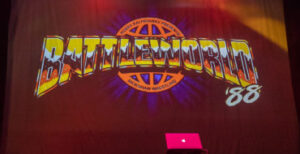What wackiness!! What verve!! Broken Sex Doll’s the kind of thing that demands a couple exclamation points. After all, it’s a sci-fi musical sex comedy – if it doesn’t hit you fast and hard, it’s done for, and Sex Doll is so often at full tilt that it manages to raunch and profane its way through most of its weaknesses. People will say, “This ain’t Shakespeare”…that’s probably unfair. It’s just less Lear and more Belch.
But all the vulgarity’s there to prove a point, right?
It’s 2136, and wide-eyed sex droids round out a population of vacant, downtrodden humans whose greatest joy is to download the experiences of others; most notably, of the long-reigning chart superstar The King. There’s not much of a sense of this world, other than its extraordinary passivity. They live, we expect, only to consume the lives of others, never truly experiencing, never truly living. This could come on too thick, and it doesn’t – the satire is familiar to us already, but it’s at least allowed to emerge naturally from the story rather than being shoved in our faces.
In appropriate sex-comedy fashion, our young heroes, the affable Darryl and the matter-of-fact android Ginger, record and upload a mind-blowing sexual experience and rise to number one in the charts, drawing the ire of The King and his vile, scheming mother…and off we go.
So there is comment made on our society; on its torpor, on its idle consumption of second-hand experience, on the sadness that lurks in its detachment. But the comment lives more in the premise than its execution. If this is John Waters’ Blade Runner, then it’s definitely more beholden to Waters.
But Waters is transgressive, boundary-pushing…is Sex Doll? Not really. Robot sex, incestuous tension, and some passing references to bestiality aren’t enough to shake the air of sexual normativity that pervades the play. The dance numbers often divide along gender lines, with the same choreography performed by both groups for a sense of egalitarian sexuality. But when the women move their hips, the audience is quiet, and when the men do the same, we laugh – they play it for comedy. The whole show is replete with the typical gender and sexual imagery of sci-fi and sex-comedy tropes. At their best, sex comedies strike out against the repression of sex and lust in all their positive forms; Doll does not.
Most frustrating with Doll’s lack of transgression is the sense of missed opportunity. Some key moments, such as The King’s sudden possession of Ginger’s body when she’s about to have sex with Darryl, cry out for exploitation (Are we about to see The King remotely experience sex as a female??) but never capitalize (…no, we’re not).
Unfortunately, what the show does transgress occasionally is the bounds of humour, and not with a pushed envelope, but with a recycled archetype. Sci-fi fans are well-used to the Nefarious Foreign Repairman, or Lascivious Tinkerer, or whatever you want to call him. In any case, he’s the grimy little expert in charge of repairing The King’s sex droids, and needless to say, he’s been raping them all, or at least Ginger, for years. When this plays in the story, though, it’s only as humour, and despite the dose of circa-1970s feminism the show gives us to counteract the nastiness, the casual treatment of the topic is liable to leave a bad taste in the mouth. Regardless of the existing debate over whether rape can be funny, it’s certainly not here. Mr. Repairman is a trope overdue for retirement.
All of the characters are well-worn tropes, but the talented cast keeps us on board with them for the most part. Benjamin Elliot, in the male lead, nails the tone of the piece with a performance that achieves perfect everyman believability through consistently hilarious exaggeration. Everything Darryl does is hyperbolic, but so comfortably so that he emerges as by far the most complete character.
Gili Roskies’ Ginger is probably the harder role. Like Data’s daughter Lal from Star Trek: The Next Generation, she’s an android who seems gifted with a capacity for feeling and love which outstrips that of her robotic companions. The balance of performing an android character is tricky enough for any actor, but Roskies is, of course, expected to sing, dance, and fight, all while maintaining the sense that her “humanity” is a programmed veneer. Though there are inconsistencies, Roskies’ dedication to her character pays off, and she and Elliot have an appealing chemistry.
The rest of the cast is game with the broad strokes they’re given: teeth-achingly superficial TV hosts, evil lackeys, over-attached mothers, and, of course, a bevy of sex droids with a heart of gold each (One’s angry, one’s silly, and one’s slapstick, who’da thought? But the actors are funny enough to sell old material). The standout character is probably Neezar’s King – the preening, self-absorbed rockstar who collapses into a gibbering mess, crying for his mother, at the smallest sign of trouble is a caricature which is sure-fire in its grossness. His rousing number “Rise and Shine,” too, is one of the strongest and most energetic of the show.
What about the music? Courtesy of the multi-talented Anton Lipovetsky, who was recently on stage in the one-man, many-characters show My Funny Valentine, the musical numbers probably hit about the ratio of the average Disney flick – a couple standouts, a couple pleasant but forgettable, a couple just forgettable. The large numbers, at least, are vibrant and boast a range of tones, with the opening number lending a surprisingly edgy and dark feel to the play. One of the great moments of the show is definitely its rap duet, when the genre most inseparably associated with aggression and loud male posturing is used to lament the sudden onset of impotence.
Broken Sex Doll is wildly unabashed, sometimes justifiably so, sometimes not. It’s ambitious, in-your-face, raunchy, too familiar, too far, and not far enough, all in one; and frankly, it’s well worth seeing just for its inconsistencies. The show aims high and falls short, but it does so spectacularly.
Click here for tickets & more information.









